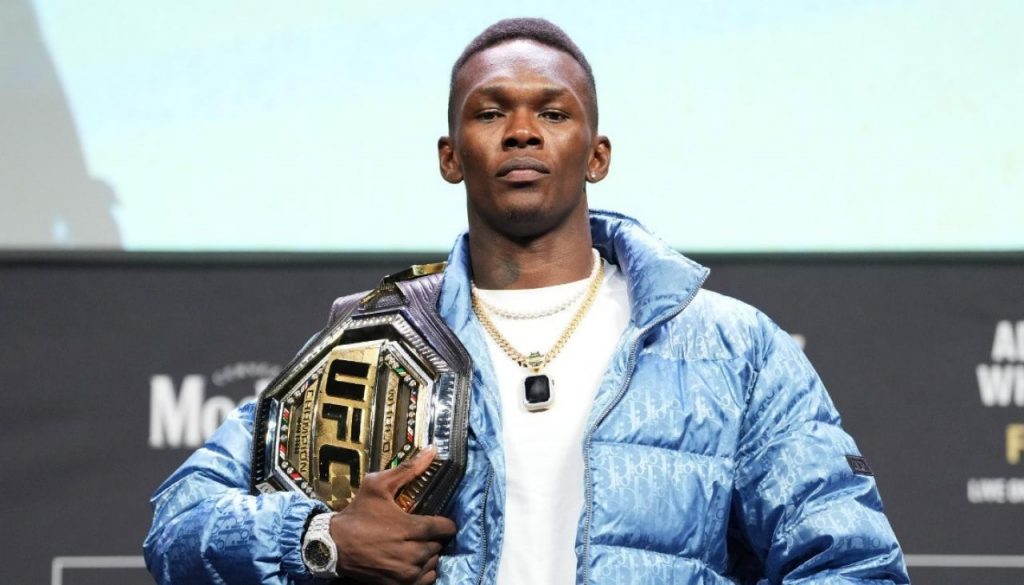Why did Israel Adesanya trash ‘sellout’ Sean Strickland for Monster Energy sponsorship: Tracing the story behind it
In the lead-up to UFC 293, the spotlight isn’t just on the anticipated showdown between Israel Adesanya and Sean Strickland inside the Octagon, but also on their heated exchange over sponsorship deals during the pre-fight press conference.

Adesanya, the reigning middleweight champion, has been a target of Strickland’s taunts, with Strickland taking jabs at Adesanya’s Chinese heritage. He referred to Adesanya as the “Chinaman” due to the champion’s history of carrying the Chinese flag during his kickboxing days.
However, Adesanya had his own ammunition ready, and it wasn’t long before he fired back at Strickland for his recent sponsorship deal with Monster Energy, a company that has faced criticism from fighters like Dominick Cruz, mainly due to its owner, Hans Molenkamp.
Adesanya questioned Strickland’s integrity, asking when he “sold his soul” to Monster Energy and suggesting that the energy drink company quickly signs fighters who are set to face him. He insinuated that Strickland compromised his principles to secure the deal.
The verbal exchange between the two fighters escalated, with Strickland defending his platform as a fighter who represents his fans and criticizing Adesanya for not truly representing his country when he fights.
The tension between Adesanya and Strickland has only added to the anticipation for their clash at UFC 293, which promises to be a fight to remember.
Debunking the Myth: The ‘Selling Your Soul to the Devil’ Misconception Surrounding Monster Energy”
Monster Energy, a popular brand in the energy drink industry, has long been the subject of unfounded rumors and urban legends, with some people mistakenly associating it with the idea of “selling your soul to the devil.” It’s crucial to separate fact from fiction when discussing this misconception.
Symbolism and Marketing: Monster Energy’s bold and edgy branding, including its distinctive “M” logo and dark color schemes, has led to misinterpretations. While some see these elements as having occult connotations, the reality is that they are primarily designed to create a strong visual identity and appeal to a target audience seeking energy and excitement.
Conspiracy Theories: Like many successful companies, Monster Energy has faced baseless conspiracy theories alleging secret dealings and affiliations with malevolent forces. Such claims lack credible evidence and often rely on sensationalism to garner attention.
Religious and Moral Beliefs: Some individuals, driven by strong religious or moral convictions, may view energy drinks with suspicion due to their caffeine content and association with a high-energy lifestyle. They may metaphorically refer to it as “selling one’s soul” as a way to express concerns about perceived indulgence or sinful behavior.
In reality, sponsorship deals between companies like Monster Energy and athletes or events are standard in the world of sports and entertainment. These agreements are grounded in conventional business practices and marketing strategies, aiming to promote products to a target demographic.
It’s crucial to critically examine and challenge misconceptions surrounding brands and products based on credible information rather than perpetuating unfounded rumors. Monster Energy, like other energy drink companies, is a commercial enterprise focused on marketing its products, and it does not engage in any occult or supernatural activities.
Did Dan Hooker break his arm at UFC 290? UFC star confirms arm break via x-ray
Is Bo Nickal’s wife pregnant? UFC star opens up on wife’s pregnancy and more at 290
Dan Hardy Proposes ‘MMA Champions League’ and Backs PFL-Bellator Merger
Follow our dedicated MMA page for instant MMA news and update
